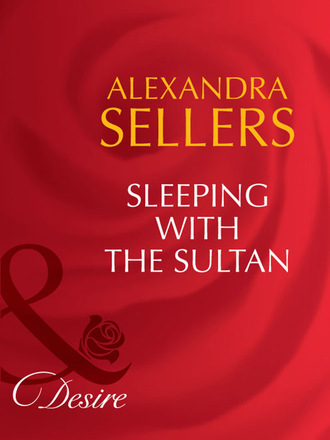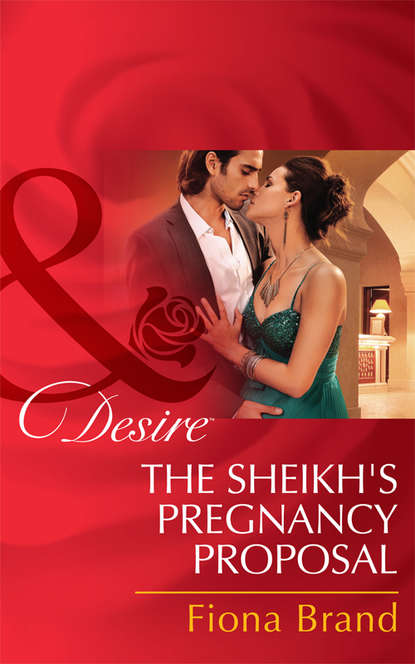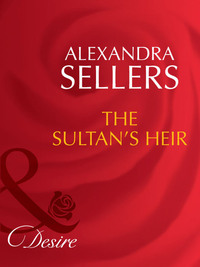
Полная версия
Sleeping with the Sultan
“I apologize. I was given to understand that you were Colonel Golbahn’s daughter.”
“My father is Khaldun Golbahn. He is no longer a colonel, and the regiment he was colonel of hasn’t existed for over thirty years,” she returned through her teeth.
Before he could respond to this, a waiter appeared to pull out her chair, and Dana gratefully turned away and sank down to accept a napkin on her lap. Only a few people were still milling around, tying up their conversations before heading to separate tables. People were watching her more or less covertly, and she realized that her argument with the stranger had given them another reason to stare and whisper.
She could sense that he was still hovering behind her. She hoped he wasn’t intending to get in the last word. Dana picked up the printed menu card propped in front of her wineglass and wished he would disappear.
“Sheikh Durran!” a crusty old voice exclaimed with satisfaction.
“Sir John,” his voice replied, and she almost fainted with horror. Her eyes flew to the place card at the setting next to her. Sheikh Ashraf Durran.
Ya Allah, she would be sitting beside him for the next two hours!
The two men were shaking hands behind her, and she heard the clap of hand against shoulder. “I was hoping to see you.” The old man dropped his voice. “How did your brother manage? Can I assume your presence tonight means I am to congratulate you?”
Dana found she was holding her breath. There was an air of mystery over the conversation, suddenly, and it gripped her. She bent further over the menu card, but she wasn’t taking in one word of what was printed.
“He was successful, Sir John, in a manner of speaking—and flying by the seat of his pants, as usual.”
He spoke quietly. His voice now held a hint of humour that she hadn’t been privileged to hear when he spoke to her. It was deep and strong, as compelling as the man. A voice an actor would kill for.
“You have it safe, then?” The old man was whispering now.
“I do.”
“Tremendous! Well done, all of you! One might almost say, an omen.”
“Mash’Allah.”
The two men sat, one on either side of her. Dana stared fixedly at the menu. She had never felt so unnerved by a situation. She reminded herself how many times in the past she had made conversation with awkward, difficult strangers, more or less successfully. There was no reason to feel as though there was a chasm in front of her.
Waiters were already circulating with trays of starters and pouring wine. Onstage the tar was being played with a heartrending virtuosity that no other instrument, she thought, ever achieved.
“Asparagus or tabbouleh?” the waiter asked her.
Dana loved the food of Bagestan; she had been raised on it. At sixteen she had stopped eating it, as a rejection of her father and all he stood for. That time of rebellion was long past; she was twenty-six now. But she found herself thrown back into that old, combative mind-set now.
She wanted to let Sheikh Ashraf Durran know that she was not to be judged by any of his rules. As she had her father.
“Asparagus, thank you,” she said, and a plate of butter-soaked green spears was set before her. She took a sip of wine.
“Tabbouleh,” Sheikh Durran firmly requested a moment later. She noticed that there was no wine in his wineglass. Well, she could have guessed that.
In the loud buzz of conversation that was going up all around the ballroom, it seemed to her that the silence between the two of them must be as obvious to everyone as their earlier disagreement. She wondered if gossip about them would find its way into the tabloids. Journalists often needed no more. Find a button and sew a coat onto it was their motto.
Dana glanced around the table in the hopes of finding a conversation to join. Somehow she had got put in with the political crowd. She recognized an academic who was often called in to discuss Bagestani affairs on a BBC current events program, and a television journalist who had made her name covering the Parvan-Kaljuk War and whose career was now devoted to reporting from one Middle East hot spot or another. Dana thought she would have enjoyed talking to them. But they were directly across the table from her, chatting quietly together.
Sir John Cross, too, was engaged with the person on his other side.
“You have no desire to see your father restored to his command, Miss Morningstar?” Sheikh Durran clearly had no reservations about picking up where they had left off.
Dana picked up a stalk of asparagus and turned her head. Up close she recognized the Parvan flag on one of his medals. He was a veteran of the Parvan-Kaljuk War, then, but she was no closer to knowing who he was.
“I have no expectation of seeing it,” she returned, before biting into the tender, delicious tip.
“Why not?”
“My father is, after all, nearly sixty. Not very much younger than President Ghasib.” She said the name deliberately, for in expat circles it wasn’t the thing to give the dictator his title. Saying it on an occasion like this was tantamount to declaring herself on the Ghasib side.
She wasn’t on the Ghasib side and never had been, not even in her days of wildest rebellion. But no way was she going to fall meekly in line with the sheikh’s expectations.
She pushed the buttery stalk into her mouth. There was no change in the sheikh’s expression, but suddenly she felt the phallic symbolism of it, almost as if he had pointed it out to her. Dream on! she wanted to snap. She chewed, then licked the butter from her fingertips before deliberately reaching for her wine again.
Sheikh Durran seemed to take no notice. He picked up a small lettuce leaf and used it to pinch up some of his tabbouleh salad.
“Do you think the only thing that will remove Ghasib from power is death from old age?”
She chose another stalk. She opened her mouth, wondering if she could unnerve him by sucking the butter from the tip. Her eyes flicked to his. His look was dry and challenging, and without any warning, heat flamed in her cheeks.
“Even granting the unlikely proposition that there was an al Jawadi heir,” she said defiantly, “even granting that this mysterious person should at last reveal himself and, even more amazingly, make the risky attempt to take power, and then granting that he should be successful in restoring the monarchy in Bagestan—what are the odds that my father would be given his old job back by someone who wasn’t even born at the time he held it?”
His eyebrows went up, but he made no answer.
“But the truth, if people would stop being excited by newspaper reports as reliable as sightings of the Abominable Snowman, is that it’s a mirage. No prince is going to come riding in on his white horse and wave his magic wand to make Ghasib disappear.”
“You know this?”
“Look—I got that nostalgia stuff at my daddy’s knee. He talked of nothing else all through my childhood. When I was a kid, I believed it. I had a huge crush on the mysterious Crown Prince who was going to make it all happen. I wrote letters to him. I even had a dream that I was going to marry him when I grew up. But he never came, did he? Thirty years now.
“I paid my dues, Sheikh Durran. I believed the myth as firmly as I believed in Santa Claus. After my mother and father split Santa Claus never visited our house again, but I went on believing in him. And I went on believing in the al Jawadi restoration, too. But a dream like that only lasts so long. And then one day you wake up and realize—it’s a fairy tale.”
“And at what age did you wake up?”
Dana tensed and wished she hadn’t spoken so openly. She wasn’t sure why she had. “From the Santa Claus myth, eight. From the prince on a white horse fiction, sixteen,” she said shortly, and applied herself to her meal.
“Sixteen,” Sheikh Ashraf repeated consideringly. “That’s young to stop believing in justice.”
She supposed he was right. But she had had a very rude and sudden awakening.
Dana shrugged, demolished another spear of asparagus, and wiped her fingers on her napkin. He waited, and she felt forced to answer. She waved a hand at the room.
“What amazes me is the number of people who never wake up—who refuse to wake up.”
“What happened at sixteen that took the stars from your eyes?”
I discovered that the father I adored was a monster and nothing he said was to be believed.
She shrugged and lied again. “Nothing in particular.”
His gaze probed her for an uncomfortable moment, but to her relief he let it pass.
“And what happened to your letters?” he asked.
“What?” she asked blankly. She automatically leaned towards him as the waiter cleared her plate.
“The letters you wrote to the Crown Prince. What became of them?”
She really wished she hadn’t told him about that. It wasn’t a part of her past she confided very often. Something had knocked her off her centre tonight.
“I really don’t know.” Her tone said, don’t care.
“They were never sent?”
“Where to? My father told me Crown Prince Kamil had escaped from the palace as a baby, with his mother carrying him in a load of Ghasib’s dirty laundry. He said they got to Parvan, but no one knew any more than that, did they?”
He hesitated. “Some knew more.”
She wasn’t sure what made her ask, “Did you ever meet him?”
Again he hesitated. “Yes, I met him.”
“He died fighting in the Kaljuk War, didn’t he? Is that where you knew him?”
Sheikh Ashraf turned his head and lifted a hand as the waiter started to fill his glass with wine. “No, thank you.”
When he turned back he seemed to have forgotten her question. After a moment Dana nodded towards the row of medals on his chest.
“You were in the Kaljuk War?”
His eyelids came down as he nodded.
“Are you Parvani?” He didn’t sound it.
“I was born in Barakat,” he said. “I was in Prince Omar’s Company.”
The almost legendary Company of Cup Companions, led by Prince Omar of Central Barakat, who had gone to war on Prince Kavian’s side. She had followed their fortunes while still at drama school. All her friends had had crushes on the Cup Companions and had plagued Dana with questions, feeling sure that, because of her background, she knew more than they did.
And she had, a little. At least she knew what the term Cup Companion meant. “In the old days, it used to mean the guys the king went on the prowl with. The sons of the aristocracy. They weren’t supposed to know or care about politics or government, only wine and love and poetry.” Cue for sighs. “But nowadays it’s just the opposite. They’re the prince’s special advisors and stuff like that. By tradition he has twelve of them,” she had explained.
There had been many more than the twelve in the Company, of course. Others recruited had been made Honorary Companions. So it wasn’t foolish to ask, “Are you one of his Cup Companions?”
He replied with a little nod. She should have guessed before. But she’d forgotten until now that Cup Companions from Parvan and the Barakat Emirates were supposed to be attending tonight.
“What’s your interest in the al Jawadis?” she pressed.
He eyed her consideringly for a moment. “Prince Omar is related to the al Jawadi through the Durrani. I, too, am a Durrani.”
“And you want to help the al Jawadi back to the throne?”
His raised his eyebrows. “Tonight we are here to raise money not for the al Jawadi, but for the victims of the drought which Ghasib’s insane agricultural policies have created.”
“Maybe, on the surface, but you know and I know that tonight there are going to be lots of under-the-table donations to the al Jawadi campaign as well.”
“Do we?”
The waiter had refilled her wineglass and she took another sip. There was juice on the table for non-drinkers, but she noticed Sheikh Durran stuck to water. But refusing alcohol didn’t prove he was a good man. No doubt her father was doing the same.
“Born in Barakat, you said. Are you Bagestani by blood?” Not all the refugees from Ghasib’s regime had fled to England or Canada, by any means. More had gone to Parvan and Barakat.
“I am half Barakati, half Bagestani,” he said, after a pause in which he seemed to calculate.
“Ah! So you’re one of those who never stopped believing in the fairy tale?”
His lips twitched again. “You might say that. And you, Miss Morningstar—you do not believe anyone is capable of removing Ghasib from power?”
“Salmon or chicken?” the waiter interrupted, and quickly set down what she asked for.
She chose automatically and scarcely noticed the interruption.
“Well, there’s always the possibility that another ambitious nephew may one day be successful in some renewed assassination attempt, I suppose,” she allowed, helping herself to the beautifully cooked vegetables offered. “Or the Islamic militants may pull it off. But Ghasib does seem to deal with both those possibilities in a very convincing way, doesn’t he? I can’t help feeling that anyone with their eyes on power, even a prince, if there is one, might be content to wait until natural causes win the day for them.”
He concentrated on the vegetables for a moment. “You think the fear of death makes cowards of us all?”
His part of the conversation so far seemed to consist entirely of questions. “Maybe. It’s the undiscovered country, isn’t it? ‘Thus conscience doth make cowards of us all,’” she recited.
His mouth went up on one side. It was the first smile she had had from him. “And who said that?”
“Hamlet. Isn’t that who you were paraphrasing?”
This produced a small laugh. Humour transformed him, she found. The fire in his eyes turned to sparkle, and he suddenly seemed much younger. Now she would place him at well under thirty-five.
“I was not paraphrasing anyone.” The flow to the new conversation was seamless as he pursued, “You know the play well?”
“I starred in a school production.”
“Interesting—I thought the star part was Hamlet himself.”
“It is the star part.” She grinned, but still did not feel easy with him. “I was at a girls’ school.”
“And you were the tallest girl?”
It occurred to her suddenly that he did not know who she was. That was why he had called her by her father’s name. Well, no surprise if a man like him didn’t watch the soaps, and she hadn’t yet landed a major film part.
She laughed. What did it matter? “Yes, I was the tallest girl by a long way,” she said. “I was a natural for the part.”
Three
“Good evening, ladies and gentlemen.”
Dana and Sheikh Ashraf had chatted more amiably for a few minutes, and then, mercifully, the conversation had opened up and become general around the table. Now the meal, delicious by any standards and stupendous compared to the food served at most other charity functions she had attended, was finished. Coffee and liqueurs had been served.
Now it was down to business.
“We have a wonderful evening lined up for you tonight….”
Dana absently sipped her Turkish coffee and let the voice of the master of ceremonies wash over her. The organizer was introduced, an earnest, small man talking about the drought and the famine it had caused. And, knowing his audience, making much of President Ghasib’s deliberate mismanagement of Bagestan’s agriculture and his habit of pocketing charity funds.
“But we have negotiated with Ghasib’s government to put our own representatives on the ground in Bagestan, and management of the funds raised tonight will never leave our control until it is safe in the hands of those who need it most….”
“I wonder if that’s true,” Dana murmured.
“Very difficult to manage, I should have thought,” Sir John Cross agreed in a low voice. “However, what else can one do? I think we must assume that some of the money gets through to those who actually need it.”
“And while we may hope and believe that we’re getting closer by the day to the moment when Ghasib’s government will be history, our priority toni—”
The audience interrupted him with applause. Dana shook her head and glanced towards Sheikh Ashraf. He was looking very sober, leaning back in his chair, his arms crossed. He was not applauding.
He turned his head and caught her eye with a dark, level gaze that seemed to probe and assess, and made her heart pound, but what he had gleaned from the examination, she couldn’t guess.
The organizer wisely kept it short and then the real star of the evening took the mike. Roddy Evans was a well-known and popular comedian, always in demand for events like this because of his ability to put people into a generous, good-natured mood and then get bundles of money out of them. Dana had always liked him.
“All right, I want every table to elect a captain, please!” he said, when his warm-up had reduced everyone to cheers, laughter and applause. “Just choose one person who’ll keep the rest of you in line this evening and take money from your wallets when instructed to do so….”
“I think it better be Dana!” someone announced. “If it comes to delivering money to the stage, she’s the one they’ll all want to see,” and the rest of the table quickly agreed.
“Sheikh Durran looks like a much better bet,” Dana protested, more out of curiosity to see how he would react than anything else. “He’s at least big enough to make any threat stick.”
“But one catches more flies with honey,” he said smoothly, waving a hand, and they all laughed and agreed.
Dana gave in with a threat.
“You’ll be sorry. Be afraid, be very afraid. I will soak you.”
Being captain turned out to be a not very onerous duty. At intervals throughout the evening, on instruction, Dana had to get a five-or ten-pound note from each of the people seated at her table and pass the money on to one of the roving hostesses. Most people were familiar with the format and had come with a supply of folding money as well as their chequebooks. In the meantime there was plenty of nonsense to keep people laughing and donating.
After a while came what most of the paying guests considered the high point—the auction. Tonight there were some real prizes. Top of the list was an all-expense-paid first-class two-week holiday at the Hotel Sheikh Daud in West Barakat, sponsored by Prince Karim.
But that would come near the end, as would the brand-new Subaru donated by Ahmed Bashir Motors. Before that there was some very exciting and somewhat drink-inspired bidding for weekends at country hotels, meals in restaurants, books, celebrity memorabilia, theatre tickets—whatever the organizers had been able to screw out of donors. The organizers here had clearly been top rank, and there was a stream of the kind of prizes that were often the top prize at lesser events.
Sprinkled among them were half a dozen “personal appearance” donations. Certain celebrities had agreed to spend an evening at a restaurant with whoever bid the highest for the honour. In the ruthless way of the entertainment industry, these prizes, like the others, were graded according to ascending value through the evening, because of the excitement the increasing amounts of money generated from the guests.
It was always interesting, and often salutary for those concerned, to see which celebrities were expected to bring in only a low bid, and which were saved to the end—with the other best prizes. The celebrities usually hated the whole process.
Most of such celebrities were women, and tonight all were, which Dana supposed was a comment on the way society was still run. She was always asked to participate in such an auction, and sometimes did, though always disliking it. If a man got you for too little, he treated you with contempt. If he paid a lot, often he thought he should be able to expect a little more than your face over the dinner table. Or, worst of all, he invited a whole horde of his friends along and expected you to act as his hostess for the evening.
But good charity organizers were ruthless, and this one had been prime, and Dana had given in.
Her name hadn’t been called yet. This was making her nervous, because although the early names didn’t usually get up in front of the crowd during the auction, the later names were often asked to do so. This let you in for even more potential humiliation if your drawing power wasn’t as strong as the organizers had assumed.
Jenny’s name had come up early. She stayed in her seat, but she had got a very respectable two thousand pounds from a real estate agent whose company name was called out at least eight times during the prolonged bidding by the savvy Roddy. Dana had expected to be the next celebrity auctioned after an interval of theatre tickets and a year’s membership to a top gym, but she wasn’t.
Nor was she the next, nor the next.
She began to feel really uncomfortable. She was not a movie star, after all; they were the ones who pulled in the really big sums. She was a mere soap star with only a couple of film credits, and if she went up after high bids and scored much less than the previous celeb, it would be embarrassing.
Next up was a gorgeous, big-breasted but brain-dead television presenter, who was called up onstage for the auction and who, after a long and well-hyped bidding war between a Harley Street cosmetic surgeon and a new car dealer, pulled nearly five thousand pounds. It was a figure which impressed the whole room.
A set of golf clubs came next, but it was clear all the real emotional heat this time had become focussed on the human portion of the auction. A very well-known middle-aged movie actress who had been included in last year’s Honours List and was now a Dame raised just over six thousand pounds. Dana started to feel very uncomfortable. Why had this woman been listed before her? It was ridiculous. Dana didn’t have anything like her pulling power.
Maybe Dana’s name had just been forgotten by the organizer. She certainly hoped so.
“It’s a bit like a slave auction,” the journalist across the table observed dispassionately, making Dana cringe even more. “I wonder why they do it?”
“Because we are made to feel, by whoever is pressuring us, that it is a small thing to ask and everyone else has agreed and we are selfish and smug if we refuse,” Dana said clearly.
And just then Roddy cried, “…a dinner date at the fabulous Riverfront Restaurant with our very own favourite bitch, Reena! Otherwise known as Brick Lane star Dana Morningstar! And she’s here tonight, ladies and gentlemen, so will you come up here, Reena, I mean, Dana, and let the folks take a look at the merchandise?”
Dana lifted her eyebrows at the journalist as one of the ever-present assistants dashed in to hold her chair and escort her to the stage amid an enthusiastic round of applause and cheers.
She smiled and twinkled her fingers as she stepped up under the lights, and wondered whether her dress was opaque or transparent at the moment.
“…and together you’ll dine on caviar, lobster and champagne provided by the fabulous Riverfront Restaurant, which as you all know is one of London’s most fabulous eateries! It’s moored right on the Thames, and you’ll be driven home afterwards in a chauffeur-driven Rolls-Royce provided by Launcelot Limos!
“So now, what am I bid for a delightful evening in Dana Morningstar’s company? You might even learn from her the secret of Reena’s demise before it’s broadcast! Do I hear five hundred, ladies and gentlemen?”
“Five hundred!”
“Oooh, quick off the mark there, Harold. That’s Harold McIntosh, ladies and gentlemen, not short of a bob or two when you run a Mayfair car dealership, now, are you? Five hundred, do I hear—”
“One thousand!”
“Ah, ha! Well, this promises to be a very exciting auction, ladies and gentlemen, not reticent at all, are we? That’s a thousand bid from—”
“Ten thousand pounds.”
It wasn’t a shout, but somehow the voice cut through the chatter and was heard by everyone. There was a collective gasp all over the room. Not only because of the enormous leap in the bidding, but because of the quality of the voice. Firm, assured, brooking no interference. And not at all the worse for drink.










